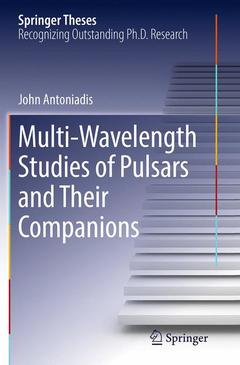Description
Multi-Wavelength Studies of Pulsars and Their Companions, Softcover reprint of the original 1st ed. 2015
Springer Theses Series
Author: Antoniadis John
Language: English
Subject for Multi-Wavelength Studies of Pulsars and Their Companions:
Multi-Wavelength Studies of Pulsars and Their Companions
Publication date: 09-2016
Support: Print on demand
Publication date: 09-2016
Support: Print on demand
Approximative price 105.49 €
In Print (Delivery period: 15 days).
Add to cart
Multi-Wavelength Studies of Pulsars and Their Companions
Publication date: 10-2014
83 p. · 15.5x23.5 cm · Hardback
Publication date: 10-2014
83 p. · 15.5x23.5 cm · Hardback
Description
/li>Contents
/li>Biography
/li>Comment
/li>
The focus of his prize-winning thesis is on observations and modeling of binary millisecond pulsars. But in addition, John Antoniadis covers a wide range of observational measurements of binary compact stars systems and tests of General Relativity, like indirect measurements of gravitational wave emission and posing the most stringent constraints on Scalar-Tensor gravity theories. Among others, he presents a system that hosts the most massive neutron star known to date, which has important ramifications for strong-field gravity and nuclear physics. This impressive work was awarded the Otto-Hahn Medal of the Max-Planck Society and the Best PhD in Gravity, Particle and Atomic physics award by the German Physics Society (DPG).
Neutron Stars and Pulsars.- Binary and Millisecond Pulsars.- An Observational Test for Low-Mass Helium-Core White-Dwarf Models.- The Relativistic Binary PSR J1738+0333.- A Massive Pulsar in a Compact Relativistic Binary.- A White Dwarf Companion to the Relativistic Pulsar J1141+6545.- Summary and Future Work.- Bibliography.
Dr. Antoniadis received his PhD in 2013 from the Rheinische Friedrich-Wilhelms-Universität in Bonn. He now is a BEACON post-doctoral fellow at Max-Planck-Institut für Radioastronomie working on the commissioning of a state-of-the-art receiver (BEACON) for the Effelsberg 100-m telescope. In parallel he's working on observational tests of general relativity using binary pulsars, theory and observations of pulsar companions and theoretical investigations of low-mass X-ray binaries.
He has won several prestigious awards like the Otto-Hahn Medal of the Max-Planck Society and the Best PhD in Gravity, Particle and Atomic physics award by the German Physics Society (DPG).
He has won several prestigious awards like the Otto-Hahn Medal of the Max-Planck Society and the Best PhD in Gravity, Particle and Atomic physics award by the German Physics Society (DPG).
Winner of the Otto-Hahn Medal of the Max-Planck Society and the Best PhD in Gravity, Particle and Atomic physics award by the German Physics Society (DPG) Presents observations of binary millisecond pulsar systems testing General Relativity and confirming energy loss by gravitational waves to extremely high precision Presents a system that hosts the most massive neutron star known to date which has important ramifications for strong-field gravity and nuclear physics Includes supplementary material: sn.pub/extras
© 2024 LAVOISIER S.A.S.
These books may interest you

Cosmology in Scalar-Tensor Gravity 158.24 €



